
AirAPI_Windows
None
Stars: 117
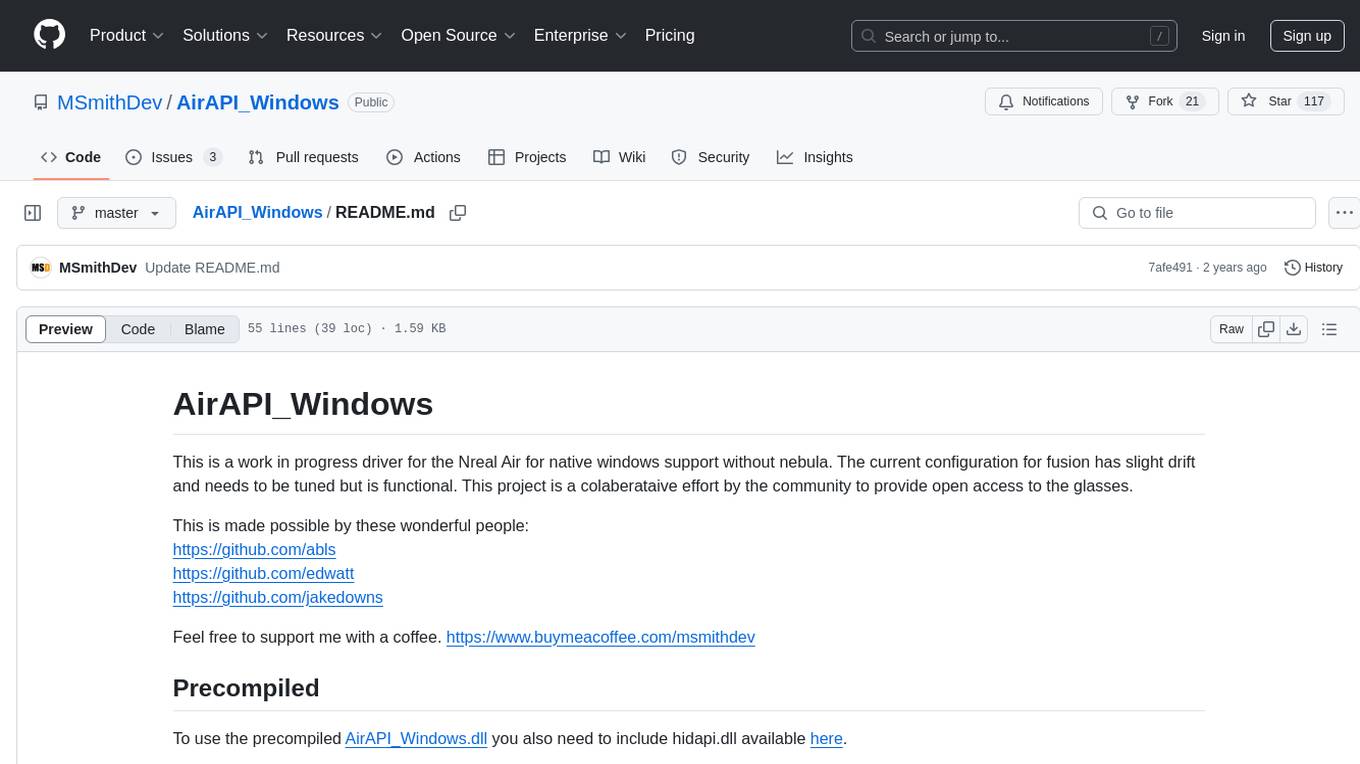
AirAPI_Windows is a work in progress driver for the Nreal Air glasses, providing native windows support without nebula. The project aims to address slight drift in fusion configuration and is a collaborative effort by the community to offer open access to the glasses. Users can access precompiled AirAPI_Windows.dll along with hidapi.dll for usage. The tool allows building from source, including getting hidapi, cloning the project, and building Fusion and AirAPI_Windows DLL. The project is supported by contributors like abls, edwatt, and jakedowns, and users can show appreciation by buying a coffee for msmithdev.
README:
This is a work in progress driver for the Nreal Air for native windows support without nebula. The current configuration for fusion has slight drift and needs to be tuned but is functional. This project is a colaberataive effort by the community to provide open access to the glasses.
This is made possible by these wonderful people:
https://github.com/abls
https://github.com/edwatt
https://github.com/jakedowns
Feel free to support me with a coffee. https://www.buymeacoffee.com/msmithdev
To use the precompiled AirAPI_Windows.dll you also need to include hidapi.dll available here.
Here is a demo in the wiki for use with unity scripts.
Here is a Unity demo using the XR plugin with the Airs setup as a headset.
Get the latest hidapi-win.zip from here.
unzip hidapi-win.zip to "deps" folder ("deps/hidapi-win").
Goto project directory
cd AirAPI_Windows
Init sub module
git submodule init
update the module
git submodule update
cd to "deps/Fusion/Fusion"
Run cmake
cmake .
Open the Project.sln and build the project
You should have a "deps/Fusion/Fusion/Release/Fusion.lib" file.
Open AirAPI_Windows.sln and make sure "Release" and "x64" are set and build.
For Tasks:
Click tags to check more tools for each tasksFor Jobs:
Alternative AI tools for AirAPI_Windows
Similar Open Source Tools

AirAPI_Windows
AirAPI_Windows is a work in progress driver for the Nreal Air glasses, providing native windows support without nebula. The project aims to address slight drift in fusion configuration and is a collaborative effort by the community to offer open access to the glasses. Users can access precompiled AirAPI_Windows.dll along with hidapi.dll for usage. The tool allows building from source, including getting hidapi, cloning the project, and building Fusion and AirAPI_Windows DLL. The project is supported by contributors like abls, edwatt, and jakedowns, and users can show appreciation by buying a coffee for msmithdev.
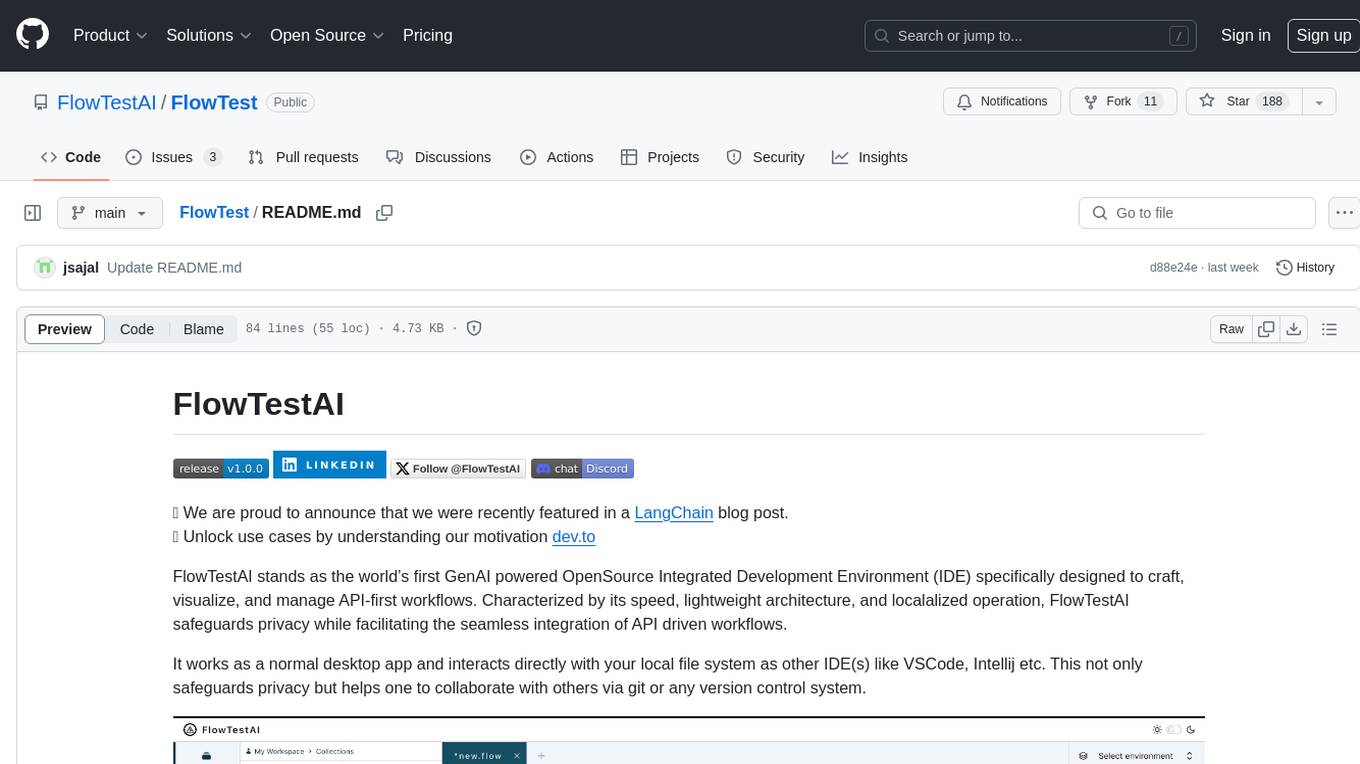
FlowTest
FlowTestAI is the world’s first GenAI powered OpenSource Integrated Development Environment (IDE) designed for crafting, visualizing, and managing API-first workflows. It operates as a desktop app, interacting with the local file system, ensuring privacy and enabling collaboration via version control systems. The platform offers platform-specific binaries for macOS, with versions for Windows and Linux in development. It also features a CLI for running API workflows from the command line interface, facilitating automation and CI/CD processes.

GlaDOS
This project aims to create a real-life version of GLaDOS, an aware, interactive, and embodied AI entity. It involves training a voice generator, developing a 'Personality Core,' implementing a memory system, providing vision capabilities, creating 3D-printable parts, and designing an animatronics system. The software architecture focuses on low-latency voice interactions, utilizing a circular buffer for data recording, text streaming for quick transcription, and a text-to-speech system. The project also emphasizes minimal dependencies for running on constrained hardware. The hardware system includes servo- and stepper-motors, 3D-printable parts for GLaDOS's body, animations for expression, and a vision system for tracking and interaction. Installation instructions cover setting up the TTS engine, required Python packages, compiling llama.cpp, installing an inference backend, and voice recognition setup. GLaDOS can be run using 'python glados.py' and tested using 'demo.ipynb'.
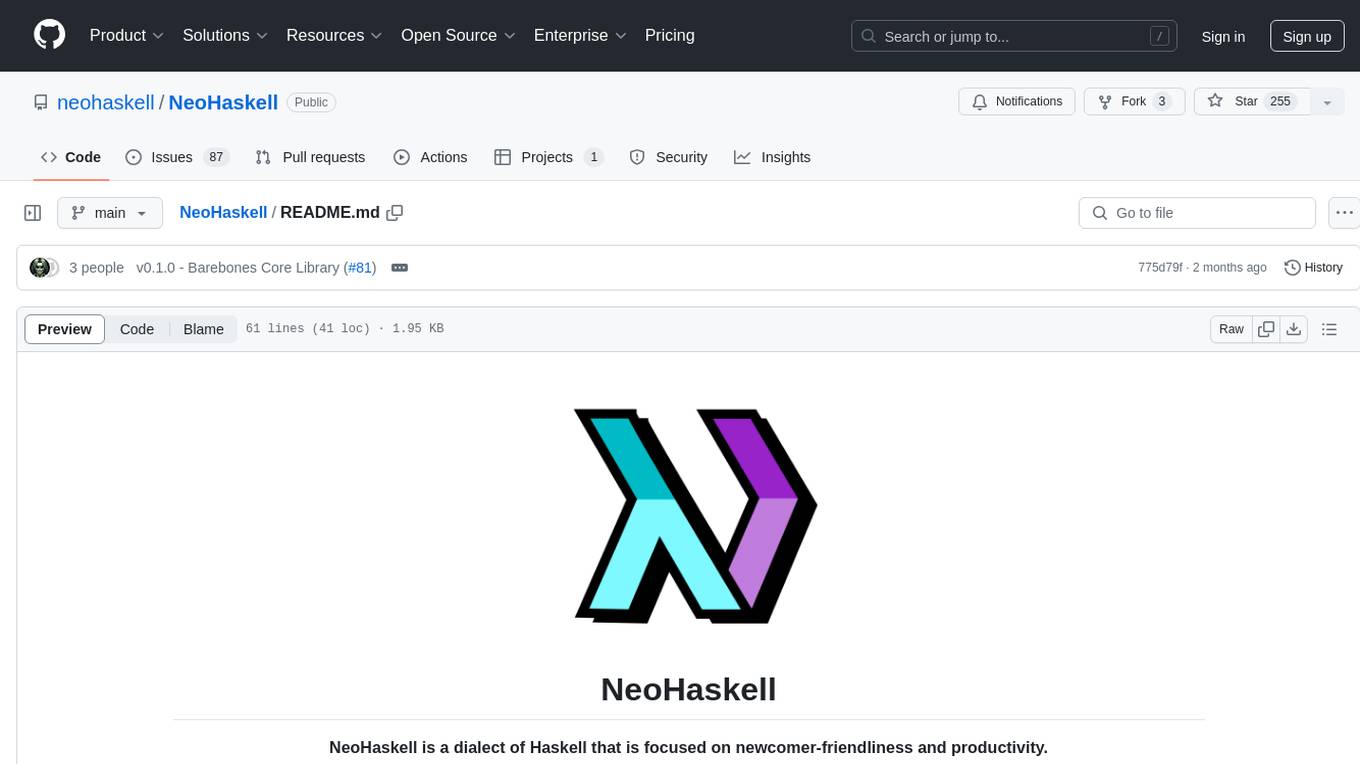
NeoHaskell
NeoHaskell is a newcomer-friendly and productive dialect of Haskell. It aims to be easy to learn and use, while also powerful enough for app development with minimal effort and maximum confidence. The project prioritizes design and documentation before implementation, with ongoing work on design documents for community sharing.
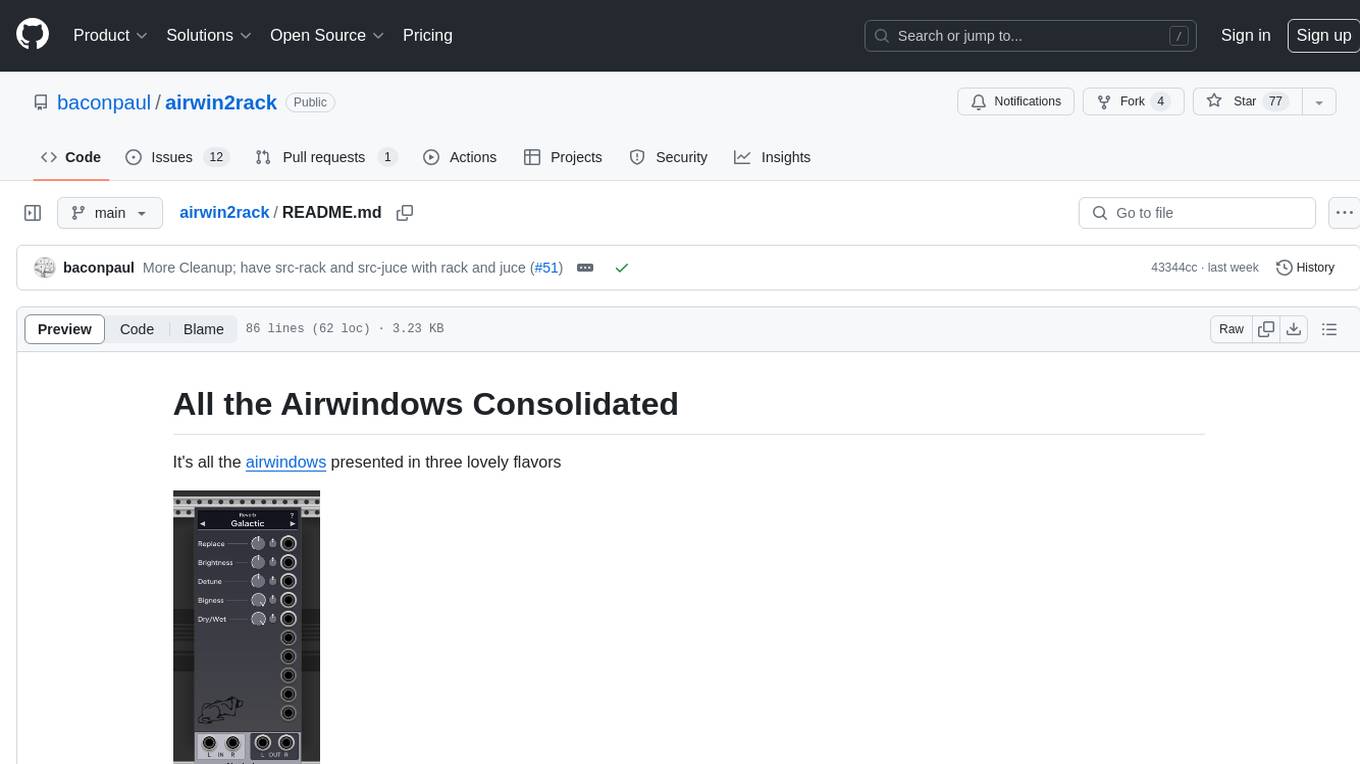
airwin2rack
The 'airwin2rack' repository is a collection of Airwindows audio plugins presented in various formats, including as a static library, a module for VCV Rack, and as CLAP/VST3/AU/LV2/Standalone plugins for DAWs. Users can access these plugins through different methods and interfaces, such as a uniform registry and access pattern, making it easy to integrate Airwindows plugins into their audio projects. The repository also provides instructions for updating the Airwindows sub-library and information on licensing, ensuring that users can utilize the plugins in both open and closed source environments.
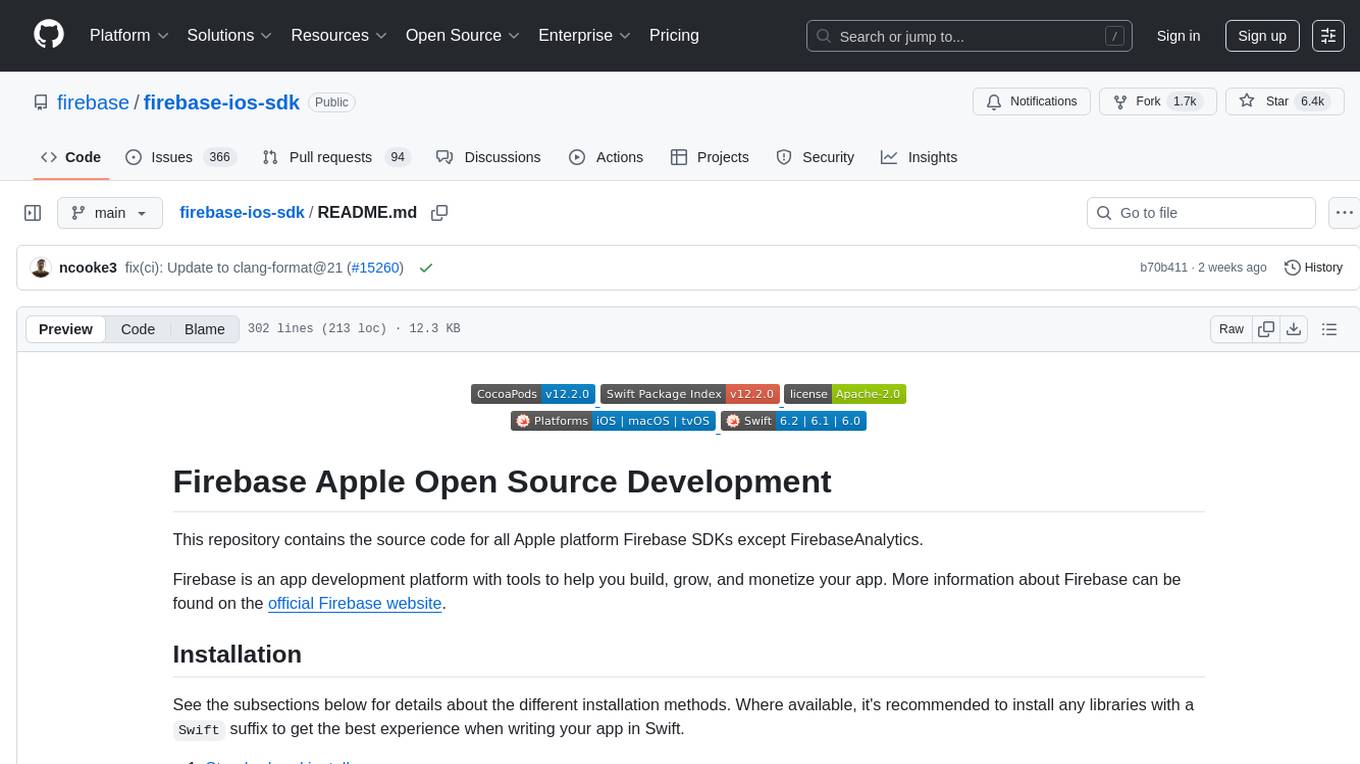
firebase-ios-sdk
This repository contains the source code for all Apple platform Firebase SDKs except FirebaseAnalytics. Firebase is an app development platform with tools to help you build, grow, and monetize your app. It provides installation methods like Standard pod install, Swift Package Manager, Installing from the GitHub repo, and Experimental Carthage. Development requires Xcode 16.2 or later, and supports CocoaPods and Swift Package Manager. The repository includes instructions for adding a new Firebase Pod, managing headers and imports, code formatting, running unit tests, running sample apps, and generating coverage reports. Specific component instructions are provided for Firebase AI Logic, Firebase Auth, Firebase Database, Firebase Dynamic Links, Firebase Performance Monitoring, Firebase Storage, and Push Notifications. Firebase also offers beta support for macOS, Catalyst, and tvOS, with community support for visionOS and watchOS.
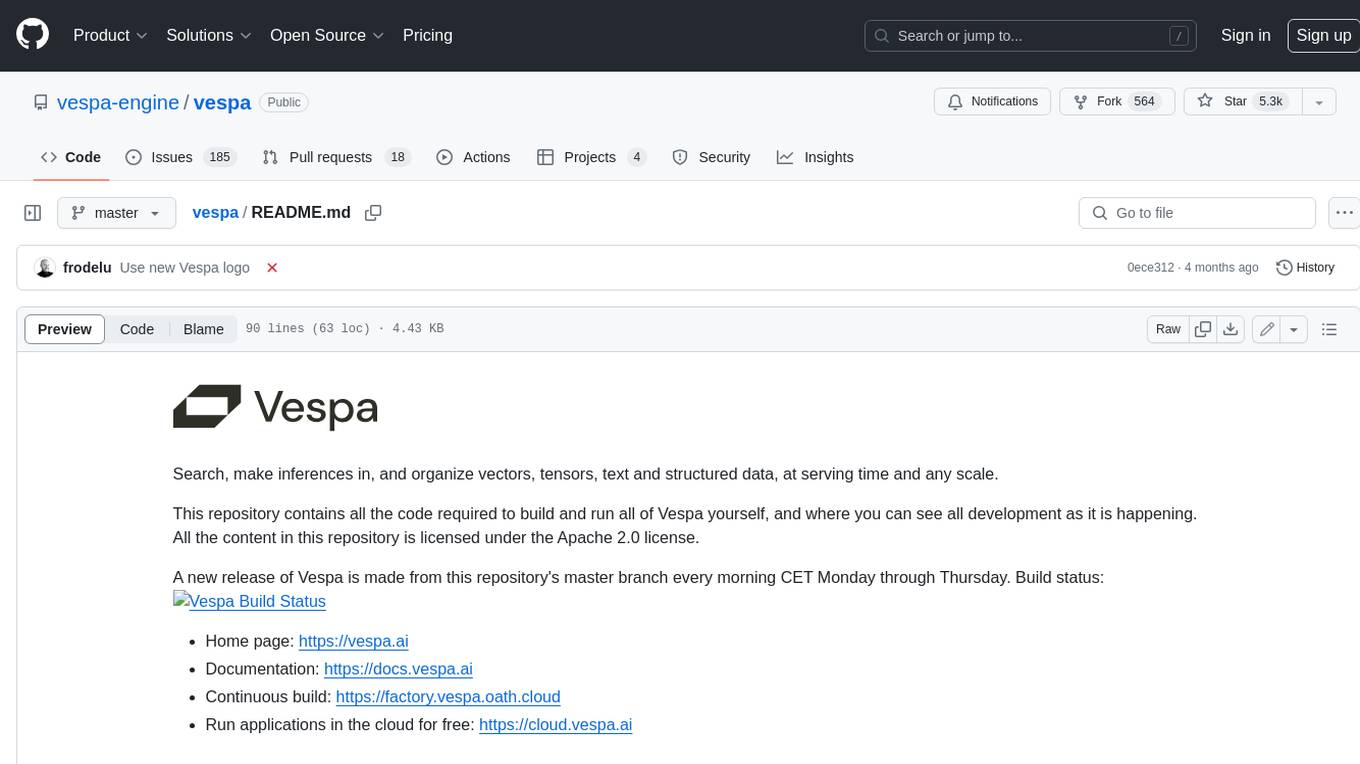
vespa
Vespa is a platform that performs operations such as selecting a subset of data in a large corpus, evaluating machine-learned models over the selected data, organizing and aggregating it, and returning it, typically in less than 100 milliseconds, all while the data corpus is continuously changing. It has been in development for many years and is used on a number of large internet services and apps which serve hundreds of thousands of queries from Vespa per second.
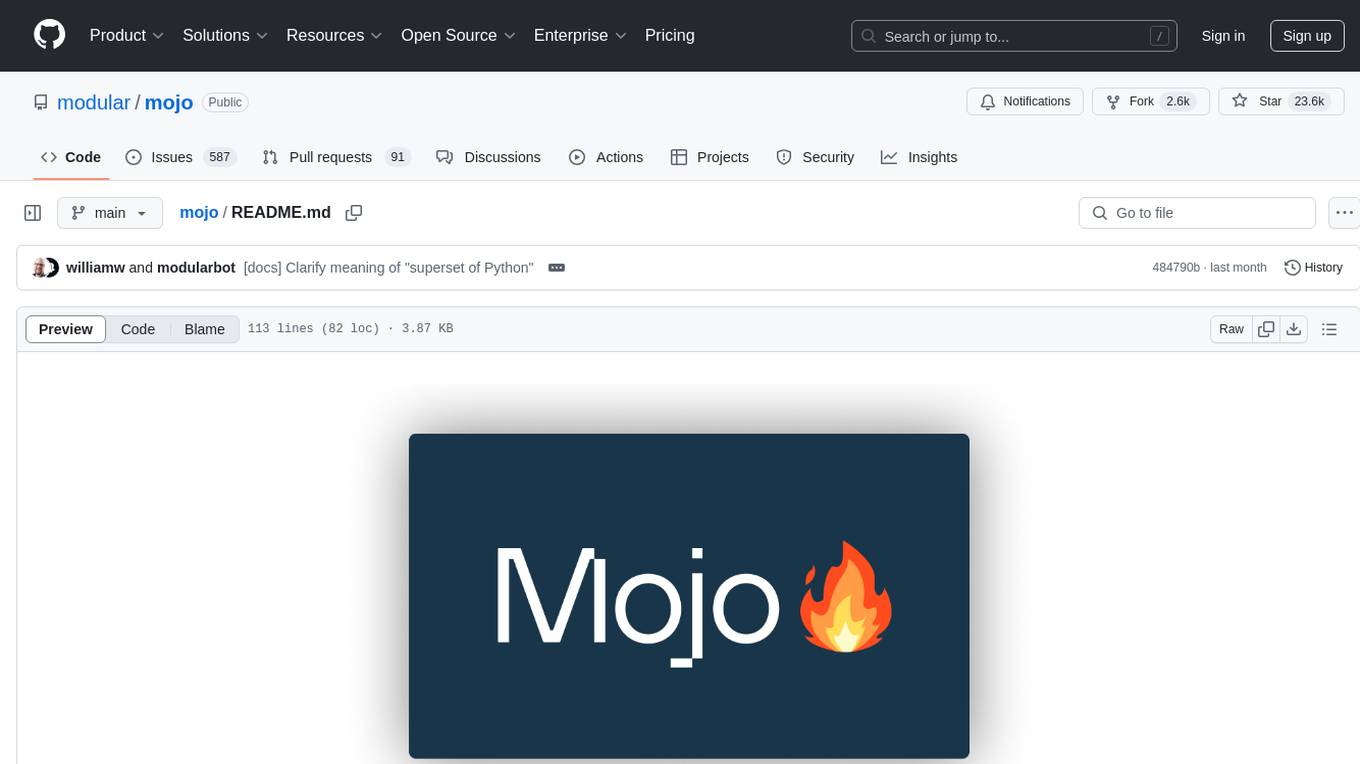
mojo
Mojo is a new programming language that combines Python syntax and ecosystem with systems programming and metaprogramming features. It aims to bridge the gap between research and production, designed to be the best way to extend Python over time. The repository includes source code for Mojo examples, documentation hosted at modular.com, and the Mojo standard library. It has two primary branches: 'main' for stable released versions and 'nightly' for the latest builds. To install Mojo, follow the guide for the last released build or use the nightly builds for a view of the development progress. Contributions are welcome on the 'nightly' branch, and the repository is licensed under the Apache License v2.0 with LLVM Exceptions.

agentok
Agentok Studio is a visual tool built for AutoGen, a cutting-edge agent framework from Microsoft and various contributors. It offers intuitive visual tools to simplify the construction and management of complex agent-based workflows. Users can create workflows visually as graphs, chat with agents, and share flow templates. The tool is designed to streamline the development process for creators and developers working on next-generation Multi-Agent Applications.

atomic_agents
Atomic Agents is a modular and extensible framework designed for creating powerful applications. It follows the principles of Atomic Design, emphasizing small and single-purpose components. Leveraging Pydantic for data validation and serialization, the framework offers a set of tools and agents that can be combined to build AI applications. It depends on the Instructor package and supports various APIs like OpenAI, Cohere, Anthropic, and Gemini. Atomic Agents is suitable for developers looking to create AI agents with a focus on modularity and flexibility.
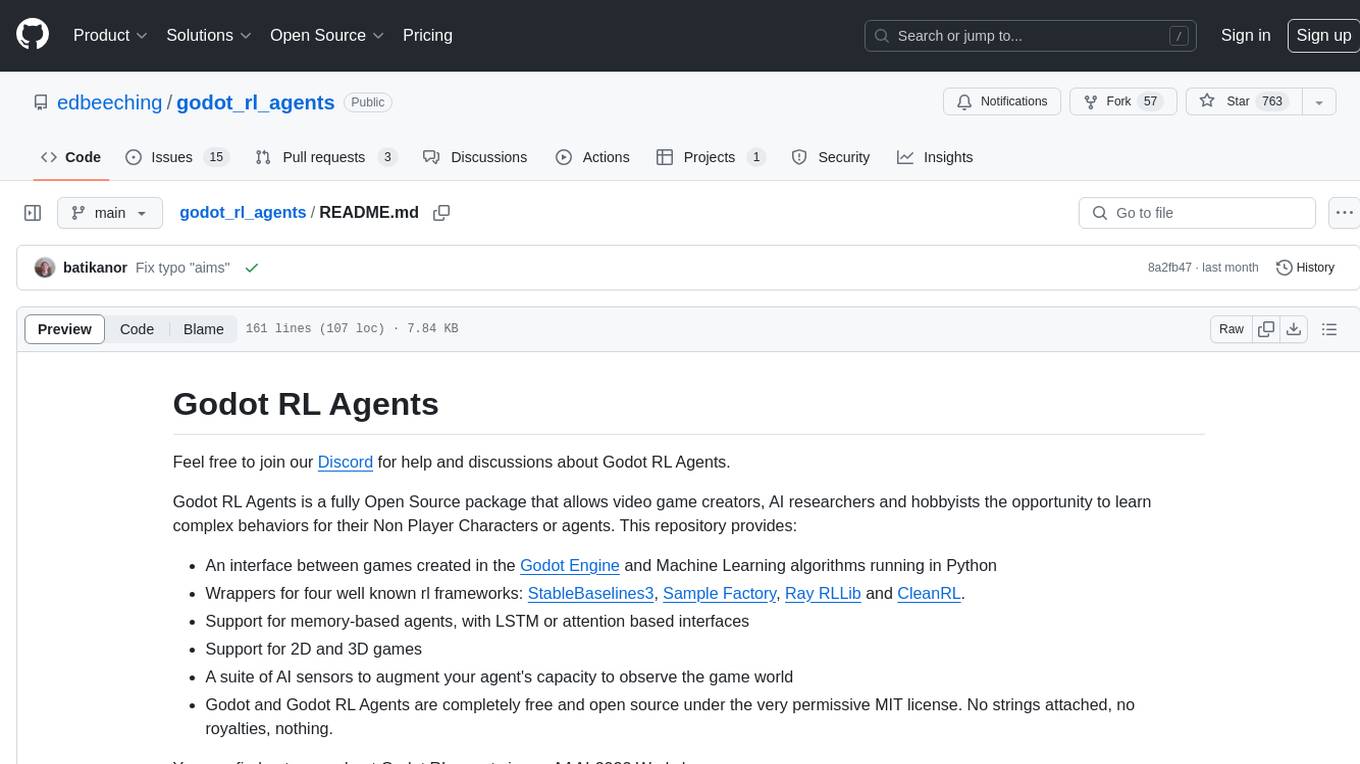
godot_rl_agents
Godot RL Agents is an open-source package that facilitates the integration of Machine Learning algorithms with games created in the Godot Engine. It provides interfaces for popular RL frameworks, support for memory-based agents, 2D and 3D games, AI sensors, and is licensed under MIT. Users can train agents in the Godot editor, create custom environments, export trained agents in ONNX format, and utilize advanced features like different RL training frameworks.
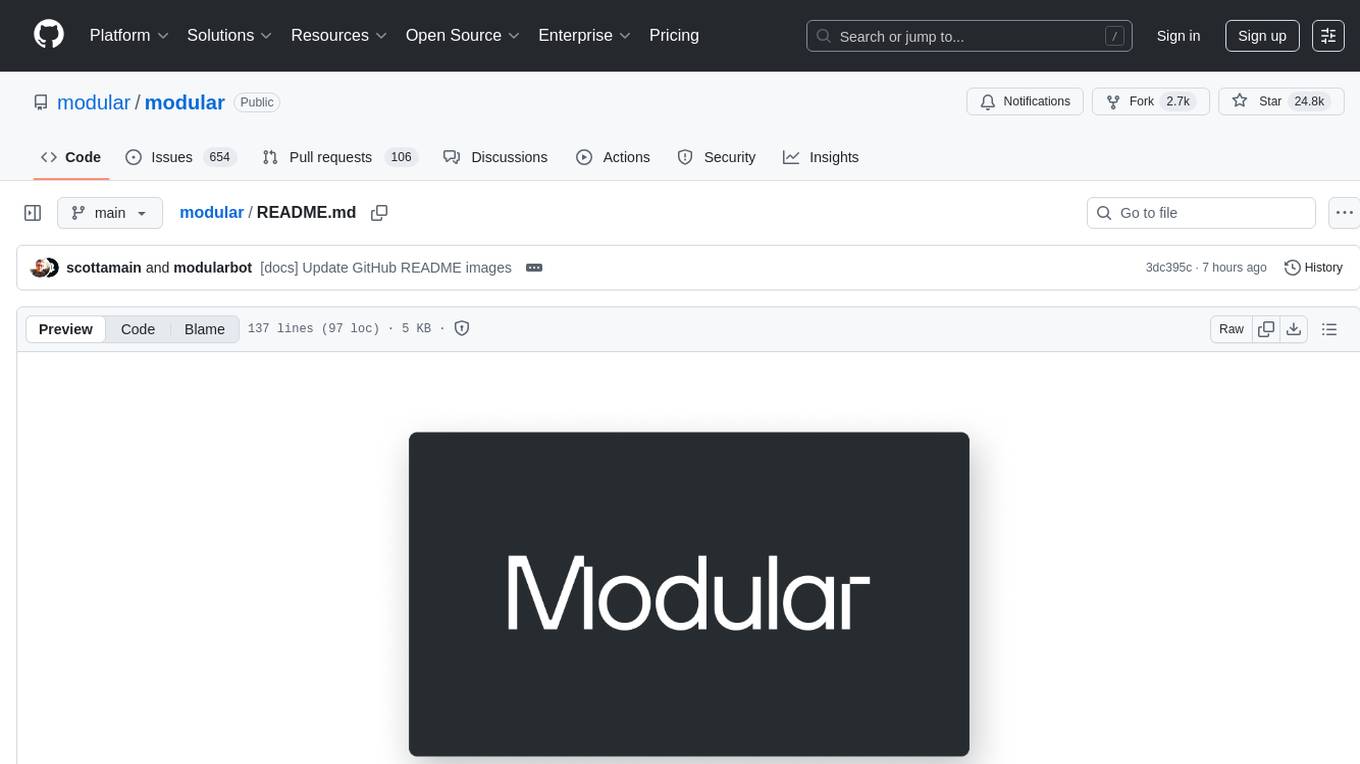
modular
The Modular Platform is a unified suite of AI libraries and tools designed for AI development and deployment. It abstracts hardware complexity to enable running popular open models with high GPU and CPU performance without code changes. The repository contains over 450,000 lines of code from 6000+ contributors, making it one of the largest open-source repositories for CPU and GPU kernels. Key components include the Mojo standard library, MAX GPU and CPU kernels, MAX inference server, MAX model pipelines, and code examples. The repository has main and stable branches for nightly builds and stable releases, respectively. Contributions are accepted for the Mojo standard library, MAX AI kernels, code examples, and Mojo docs.
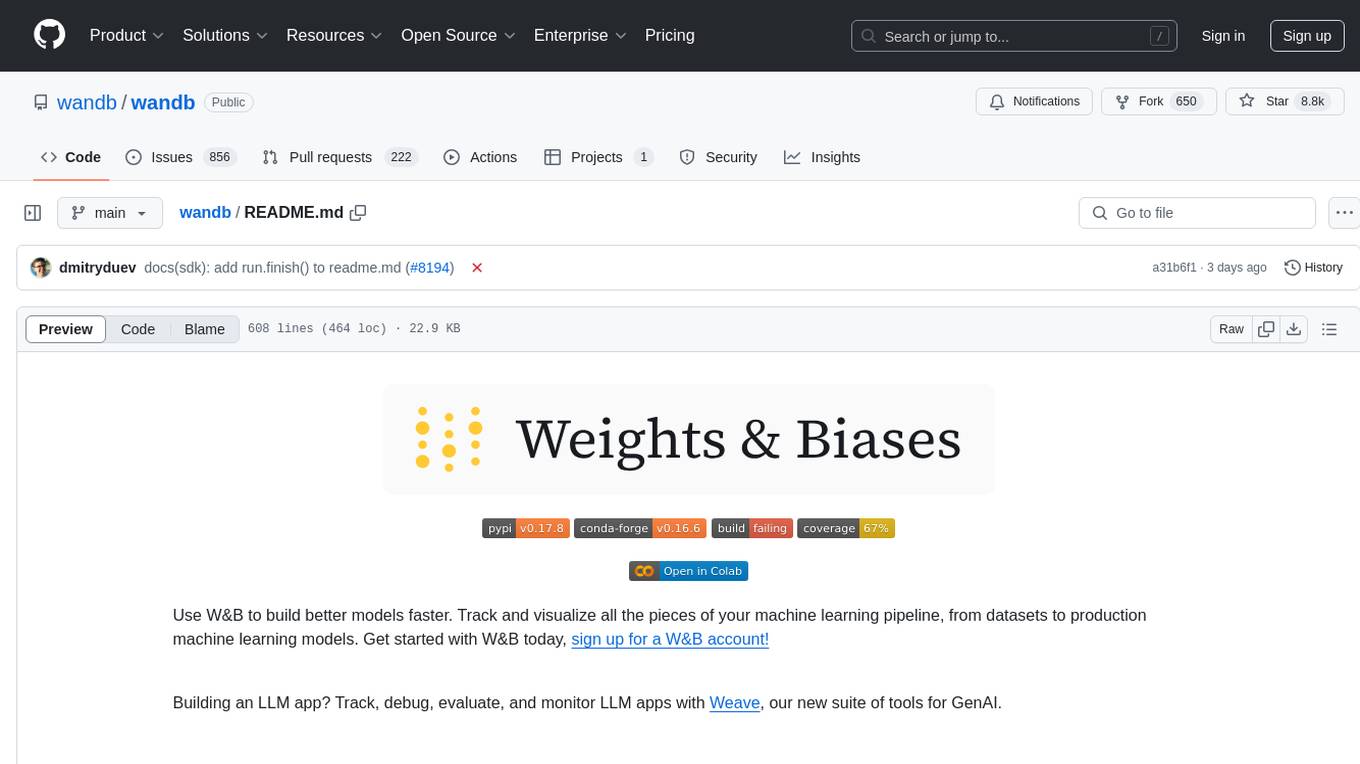
wandb
Weights & Biases (W&B) is a platform that helps users build better machine learning models faster by tracking and visualizing all components of the machine learning pipeline, from datasets to production models. It offers tools for tracking, debugging, evaluating, and monitoring machine learning applications. W&B provides integrations with popular frameworks like PyTorch, TensorFlow/Keras, Hugging Face Transformers, PyTorch Lightning, XGBoost, and Sci-Kit Learn. Users can easily log metrics, visualize performance, and compare experiments using W&B. The platform also supports hosting options in the cloud or on private infrastructure, making it versatile for various deployment needs.
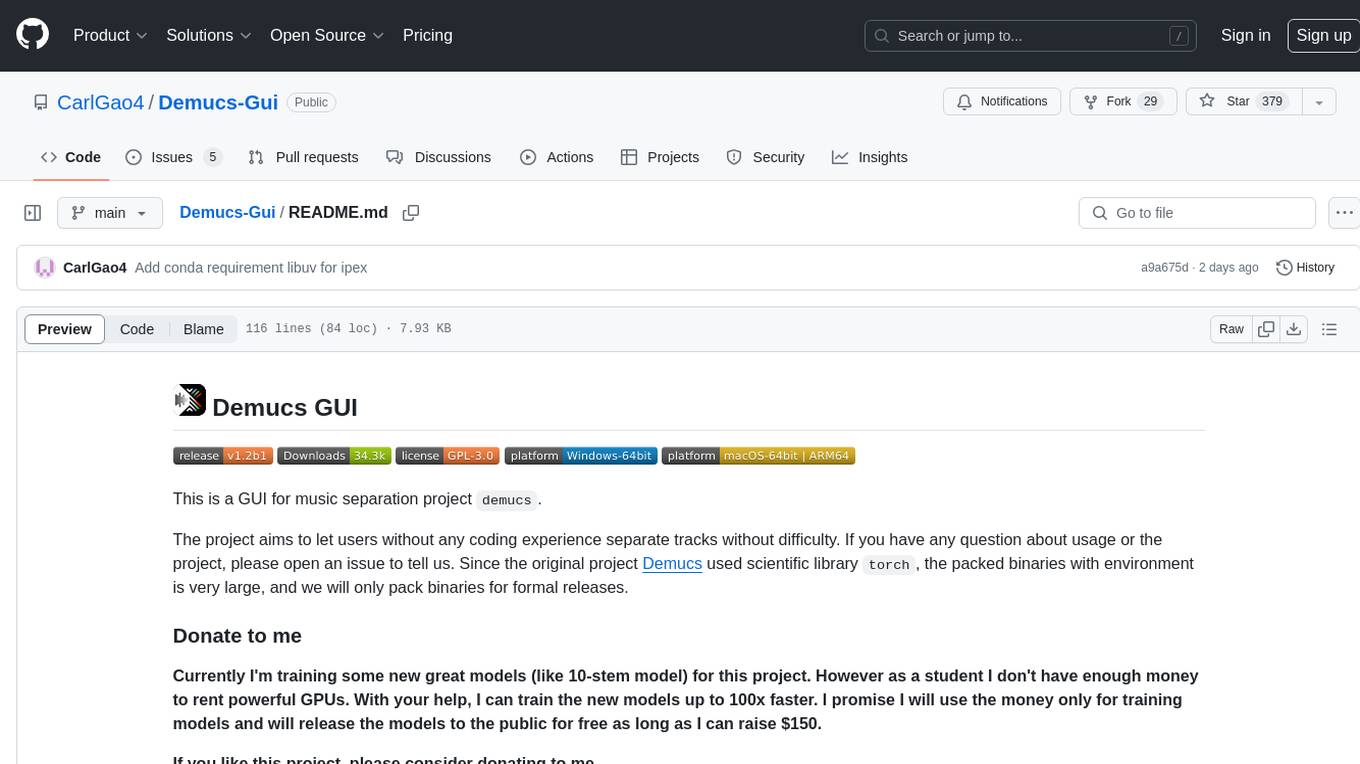
Demucs-Gui
Demucs GUI is a graphical user interface for the music separation project Demucs. It aims to allow users without coding experience to easily separate tracks. The tool provides a user-friendly interface for running the Demucs project, which originally used the scientific library torch. The GUI simplifies the process of separating tracks and provides support for different platforms such as Windows, macOS, and Linux. Users can donate to support the development of new models for the project, and the tool has specific system requirements including minimum system versions and hardware specifications.
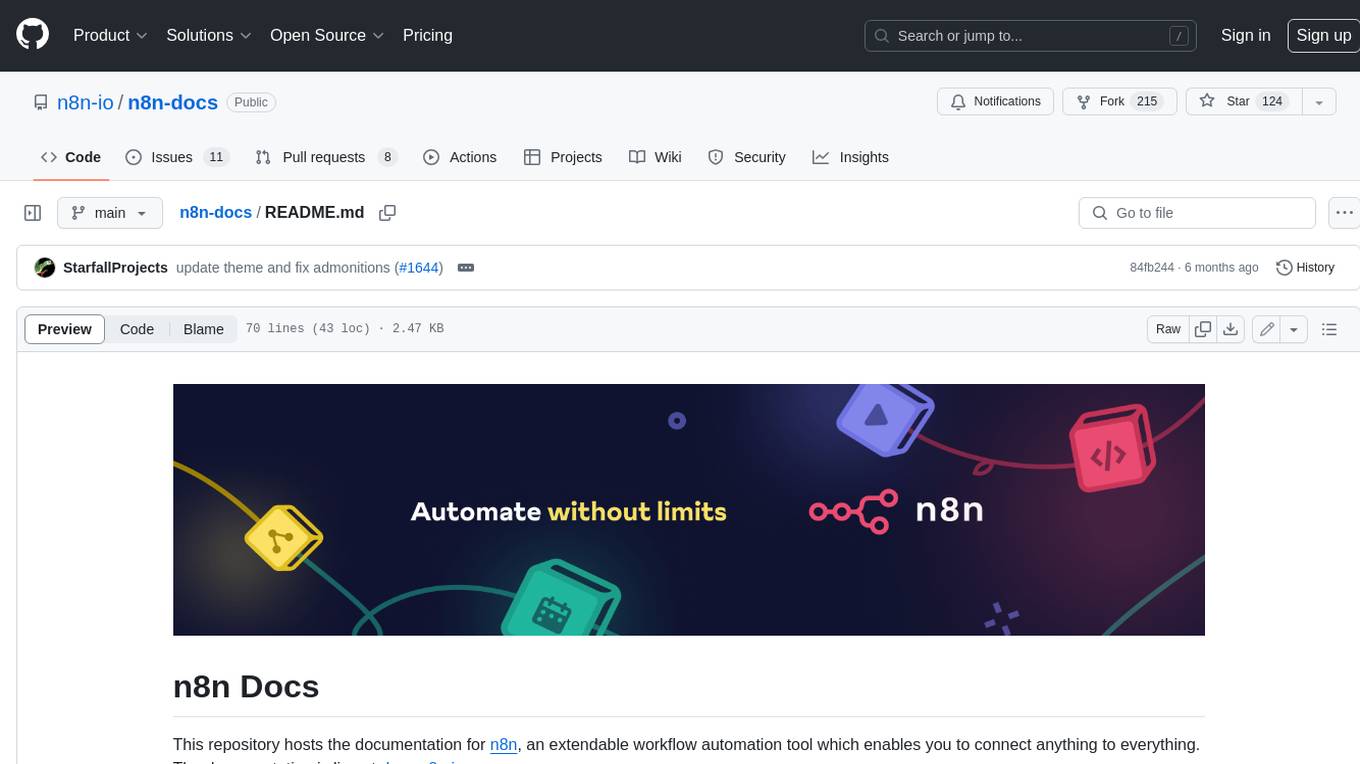
n8n-docs
n8n is an extendable workflow automation tool that enables you to connect anything to everything. It is open-source and can be self-hosted or used as a service. n8n provides a visual interface for creating workflows, which can be used to automate tasks such as data integration, data transformation, and data analysis. n8n also includes a library of pre-built nodes that can be used to connect to a variety of applications and services. This makes it easy to create complex workflows without having to write any code.
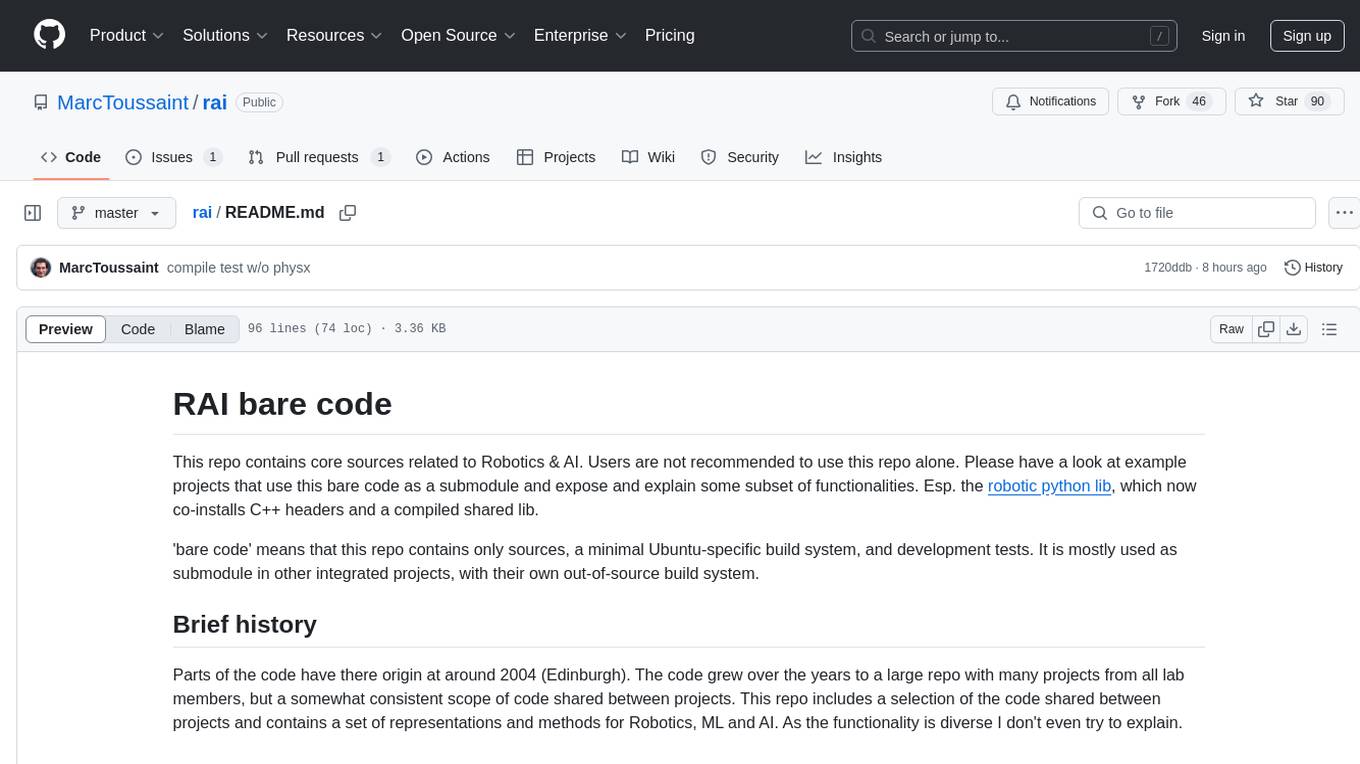
rai
This repository contains core sources related to Robotics & AI. It serves as a submodule in integrated projects, providing a minimal Ubuntu-specific build system and development tests. The code originated around 2004 in Edinburgh and has grown over the years to encompass various functionalities for Robotics, ML, and AI. Users are advised to explore example projects using this bare code for a better understanding of its capabilities.
For similar tasks

AirAPI_Windows
AirAPI_Windows is a work in progress driver for the Nreal Air glasses, providing native windows support without nebula. The project aims to address slight drift in fusion configuration and is a collaborative effort by the community to offer open access to the glasses. Users can access precompiled AirAPI_Windows.dll along with hidapi.dll for usage. The tool allows building from source, including getting hidapi, cloning the project, and building Fusion and AirAPI_Windows DLL. The project is supported by contributors like abls, edwatt, and jakedowns, and users can show appreciation by buying a coffee for msmithdev.
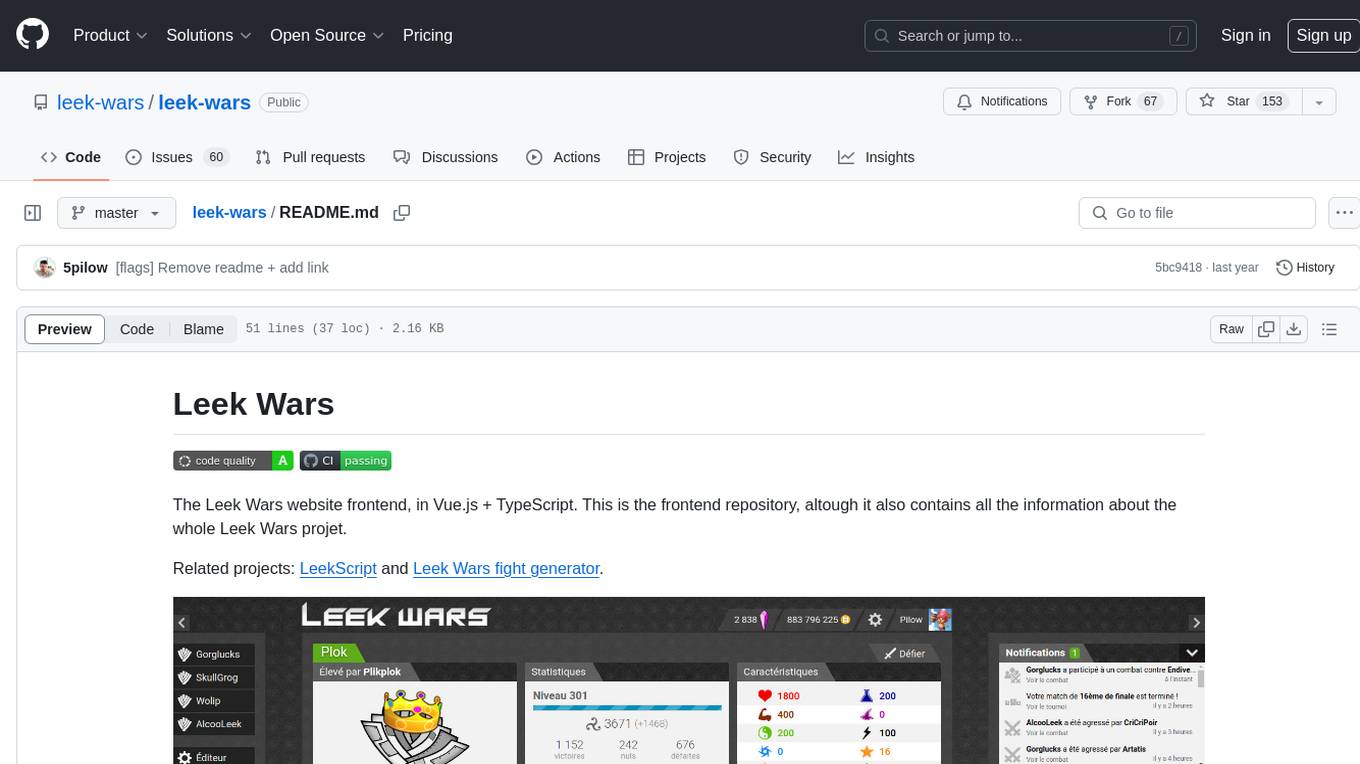
leek-wars
The Leek Wars website frontend, in Vue.js + TypeScript. This repository contains all the information about the whole Leek Wars project. It is easy to install and deploy, but be careful as it is connected to the production server. Accepts pull requests and uses various libraries like Vue.js, Vuex, CodeMirror, Chartist, Katex, and Flags. Connect with Leek Wars on Twitter, Facebook, and GitHub. Distributed under the GPL3 license.
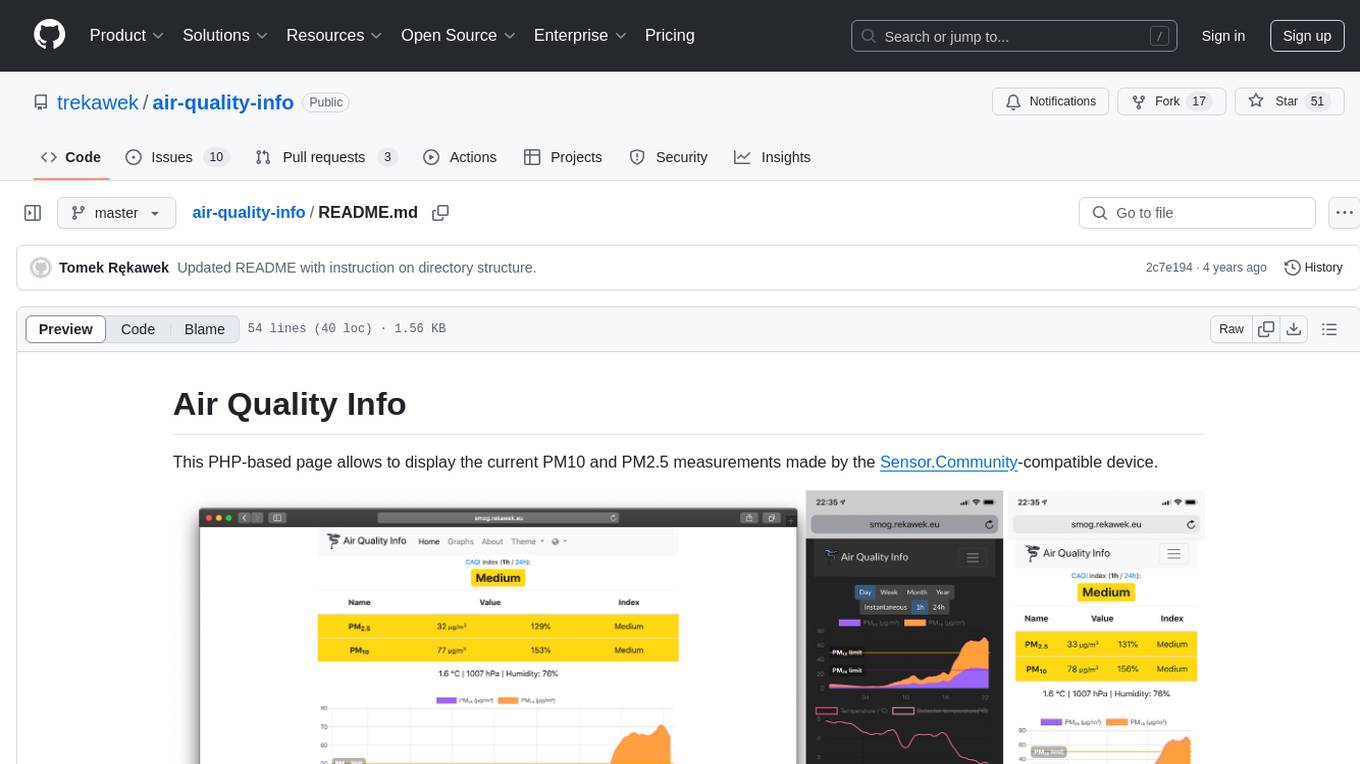
air-quality-info
Air Quality Info is a PHP-based page that displays current PM10 and PM2.5 measurements from Sensor.Community-compatible devices. It features a clean interface, stores records in MySQL, renders graphs with ChartJS, supports multiple devices, offers locale support, and functions as a Progressive Web App. The project setup involves creating directory structures, setting permissions, and starting Docker containers. The admin dashboard is accessible at http://aqi.eco.localhost:8080/, while the Air Quality Info pages use a specific naming schema. The project is supported by Nettigo Air Monitor, Sensor.Community, and a forum thread in Polish.
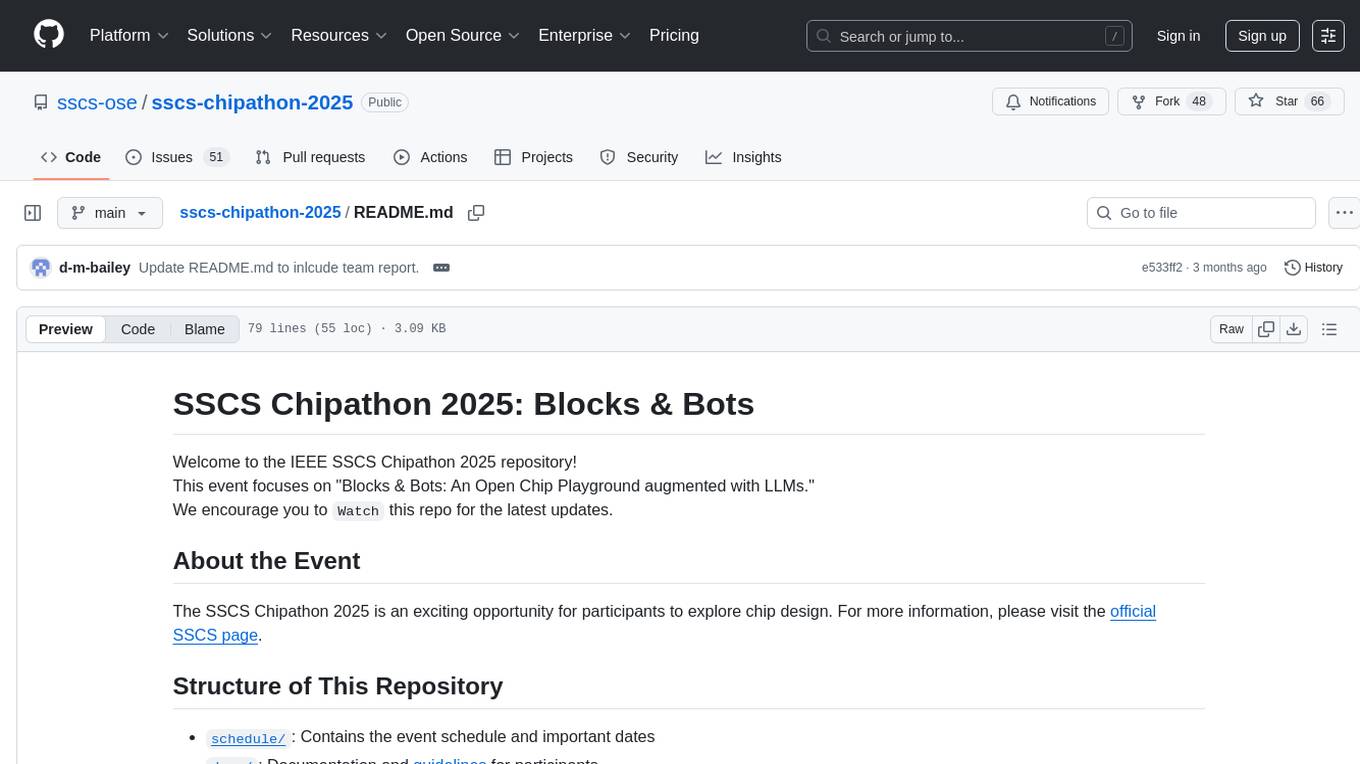
sscs-chipathon-2025
SSCS-Chipathon-2025 is a GitHub repository containing code and resources for a hackathon event focused on developing innovative solutions using chip technology. The repository includes sample projects, documentation, and tools to help participants build and showcase their projects during the hackathon. Participants can collaborate, learn, and experiment with chip technology to create impactful and cutting-edge solutions. The repository aims to inspire creativity, foster collaboration, and drive innovation in the field of chip technology.
For similar jobs
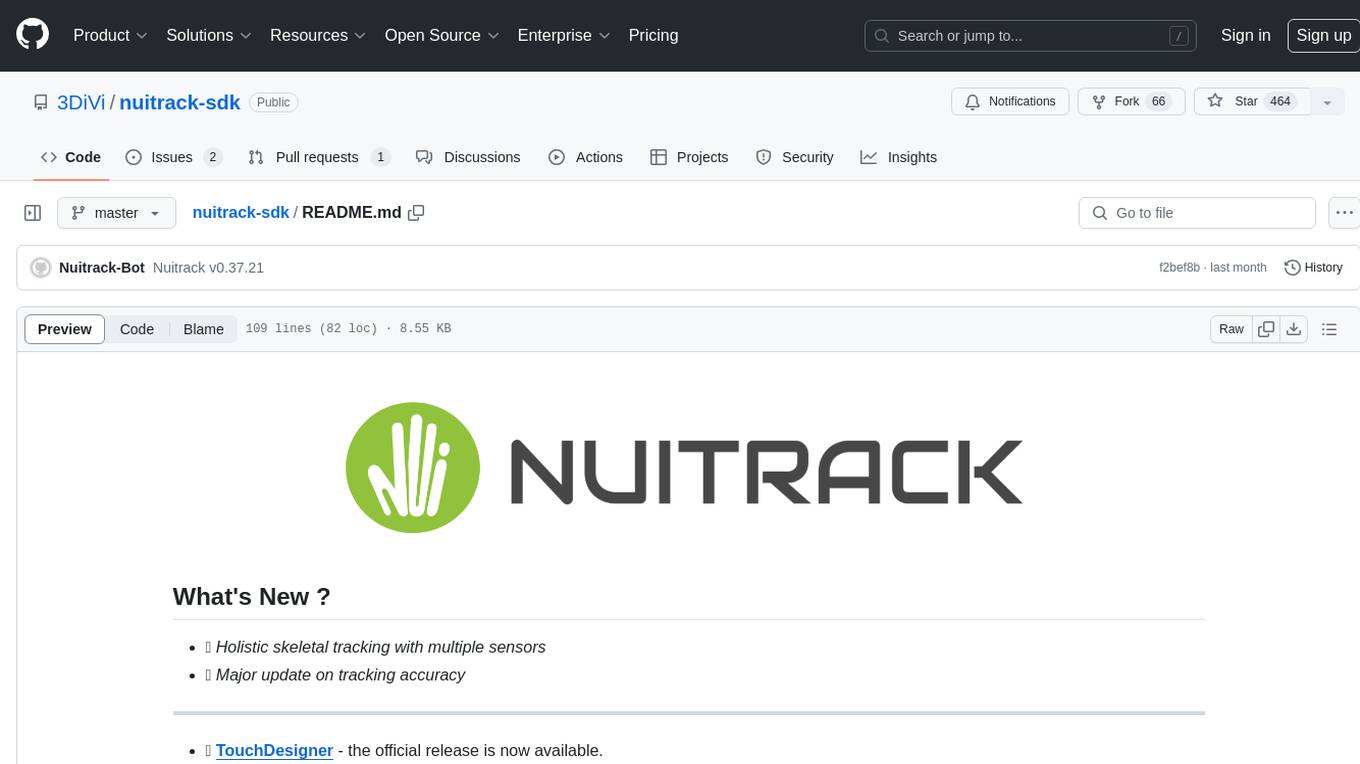
nuitrack-sdk
Nuitrack™ is an ultimate 3D body tracking solution developed by 3DiVi Inc. It enables body motion analytics applications for virtually any widespread depth sensors and hardware platforms, supporting a wide range of applications from real-time gesture recognition on embedded platforms to large-scale multisensor analytical systems. Nuitrack provides highly-sophisticated 3D skeletal tracking, basic facial analysis, hand tracking, and gesture recognition APIs for UI control. It offers two skeletal tracking engines: classical for embedded hardware and AI for complex poses, providing a human-centric spatial understanding tool for natural and intelligent user engagement.
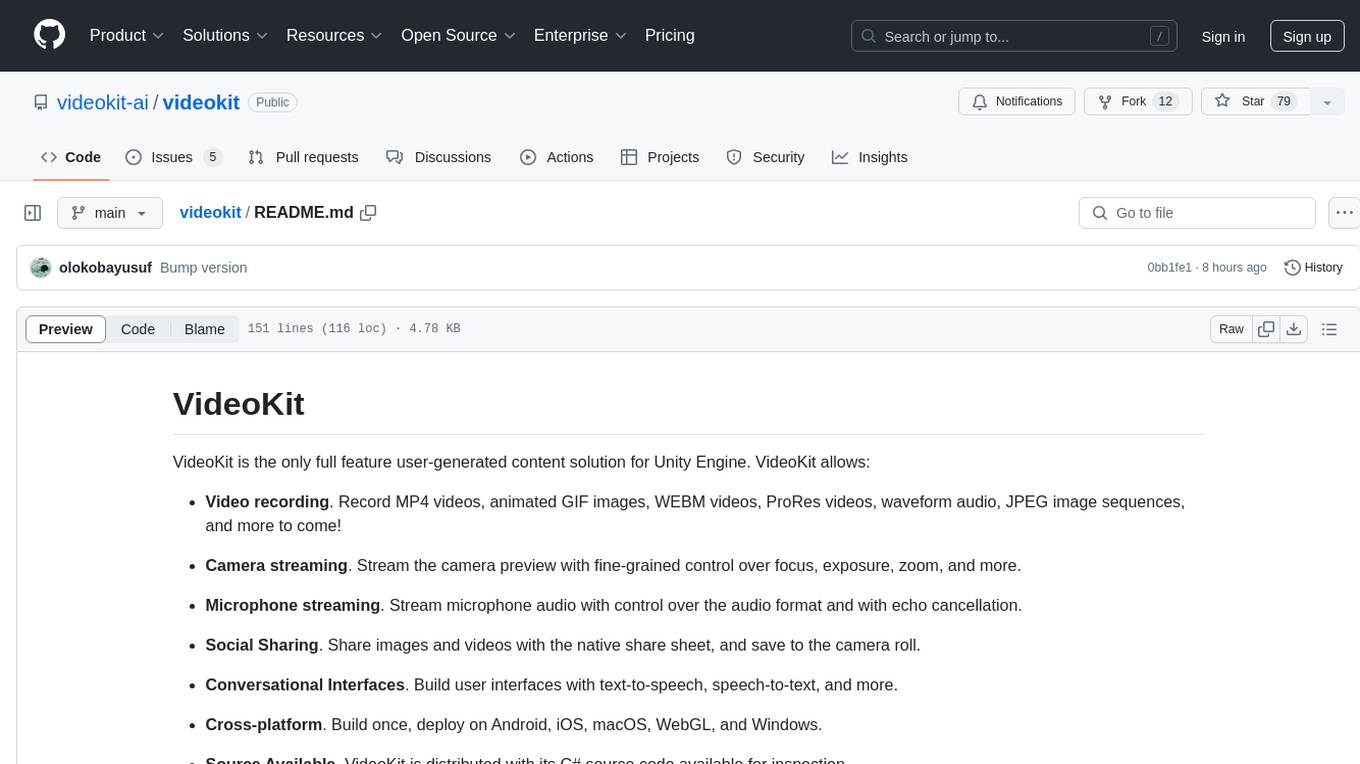
videokit
VideoKit is a full-featured user-generated content solution for Unity Engine, enabling video recording, camera streaming, microphone streaming, social sharing, and conversational interfaces. It is cross-platform, with C# source code available for inspection. Users can share media, save to camera roll, pick from camera roll, stream camera preview, record videos, remove background, caption audio, and convert text commands. VideoKit requires Unity 2022.3+ and supports Android, iOS, macOS, Windows, and WebGL platforms.

AirAPI_Windows
AirAPI_Windows is a work in progress driver for the Nreal Air glasses, providing native windows support without nebula. The project aims to address slight drift in fusion configuration and is a collaborative effort by the community to offer open access to the glasses. Users can access precompiled AirAPI_Windows.dll along with hidapi.dll for usage. The tool allows building from source, including getting hidapi, cloning the project, and building Fusion and AirAPI_Windows DLL. The project is supported by contributors like abls, edwatt, and jakedowns, and users can show appreciation by buying a coffee for msmithdev.
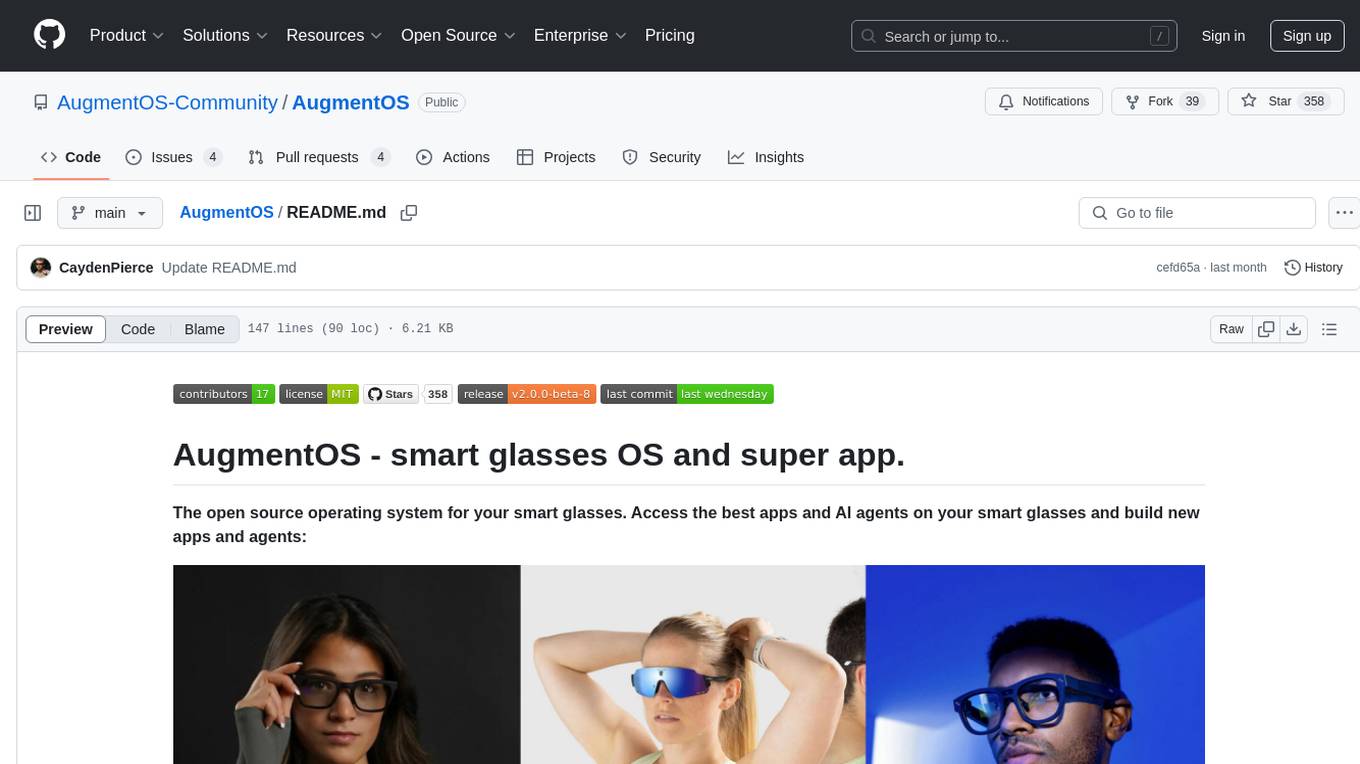
AugmentOS
AugmentOS is an open source operating system for smart glasses that allows users to access various apps and AI agents. It enables developers to easily build and run apps on smart glasses, run multiple apps simultaneously, and interact with AI assistants, translation services, live captions, and more. The platform also supports language learning, ADHD tools, and live language translation. AugmentOS is designed to enhance the user experience of smart glasses by providing a seamless and proactive interaction with AI-first wearables apps.
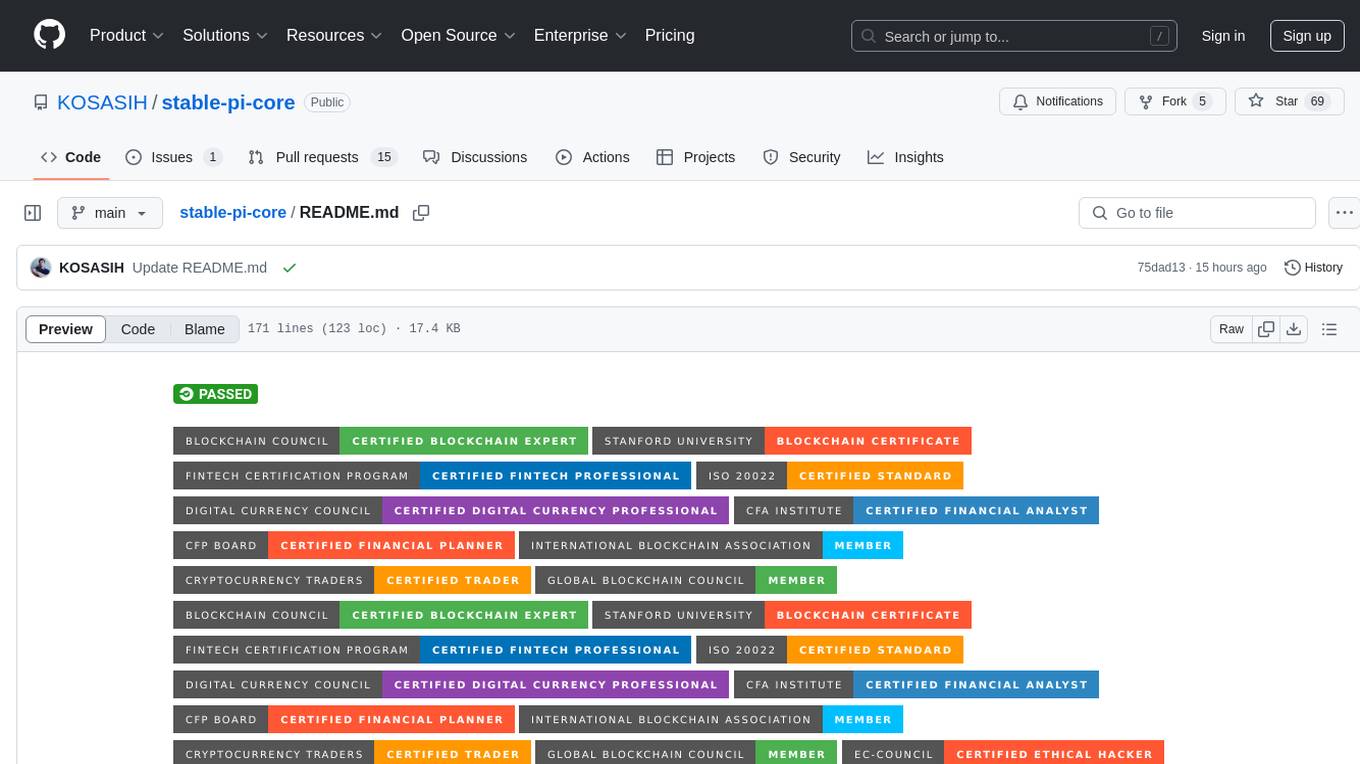
stable-pi-core
Stable-Pi-Core is a next-generation decentralized ecosystem integrating blockchain, quantum AI, IoT, edge computing, and AR/VR for secure, scalable, and personalized solutions in payments, governance, and real-world applications. It features a Dual-Value System, cross-chain interoperability, AI-powered security, and a self-healing network. The platform empowers seamless payments, decentralized governance via DAO, and real-world applications across industries, bridging digital and physical worlds with innovative features like robotic process automation, machine learning personalization, and a dynamic cross-chain bridge framework.
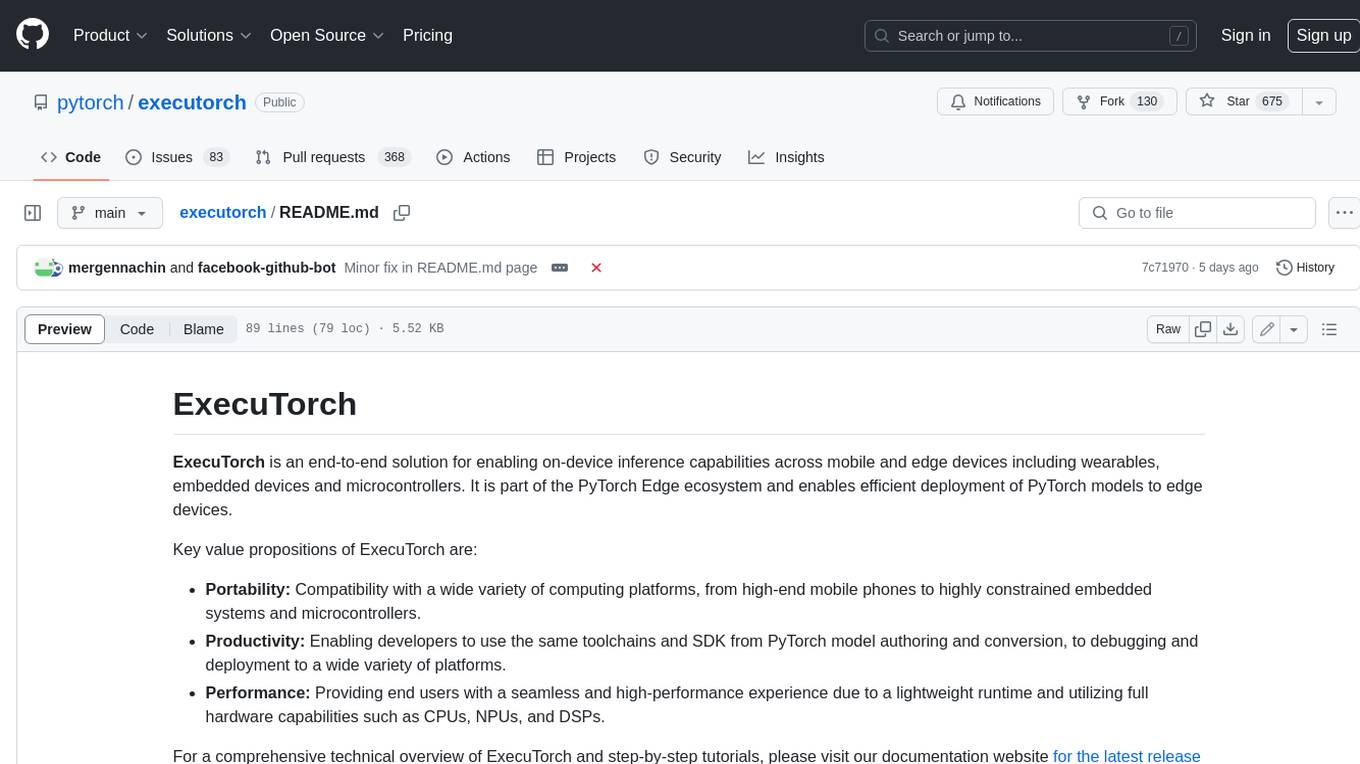
executorch
ExecuTorch is an end-to-end solution for enabling on-device inference capabilities across mobile and edge devices including wearables, embedded devices and microcontrollers. It is part of the PyTorch Edge ecosystem and enables efficient deployment of PyTorch models to edge devices. Key value propositions of ExecuTorch are: * **Portability:** Compatibility with a wide variety of computing platforms, from high-end mobile phones to highly constrained embedded systems and microcontrollers. * **Productivity:** Enabling developers to use the same toolchains and SDK from PyTorch model authoring and conversion, to debugging and deployment to a wide variety of platforms. * **Performance:** Providing end users with a seamless and high-performance experience due to a lightweight runtime and utilizing full hardware capabilities such as CPUs, NPUs, and DSPs.
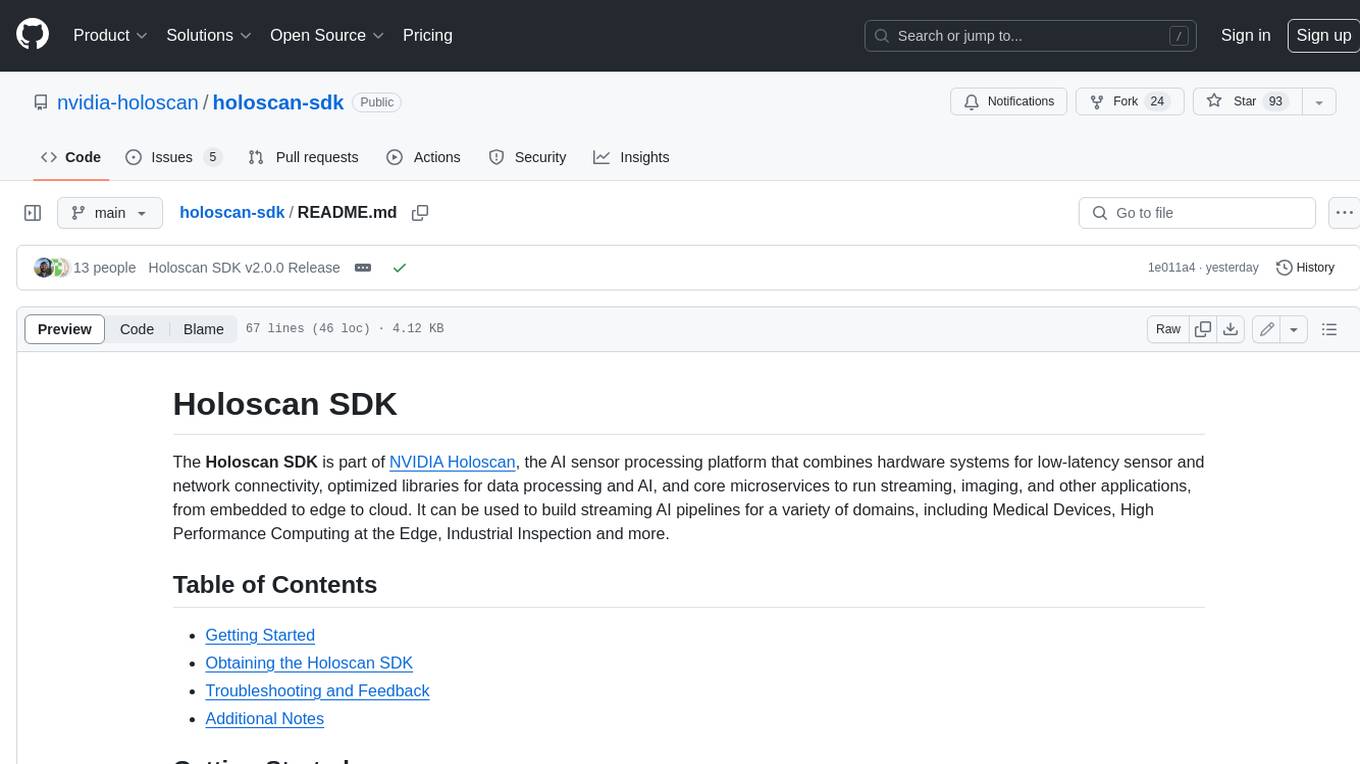
holoscan-sdk
The Holoscan SDK is part of NVIDIA Holoscan, the AI sensor processing platform that combines hardware systems for low-latency sensor and network connectivity, optimized libraries for data processing and AI, and core microservices to run streaming, imaging, and other applications, from embedded to edge to cloud. It can be used to build streaming AI pipelines for a variety of domains, including Medical Devices, High Performance Computing at the Edge, Industrial Inspection and more.
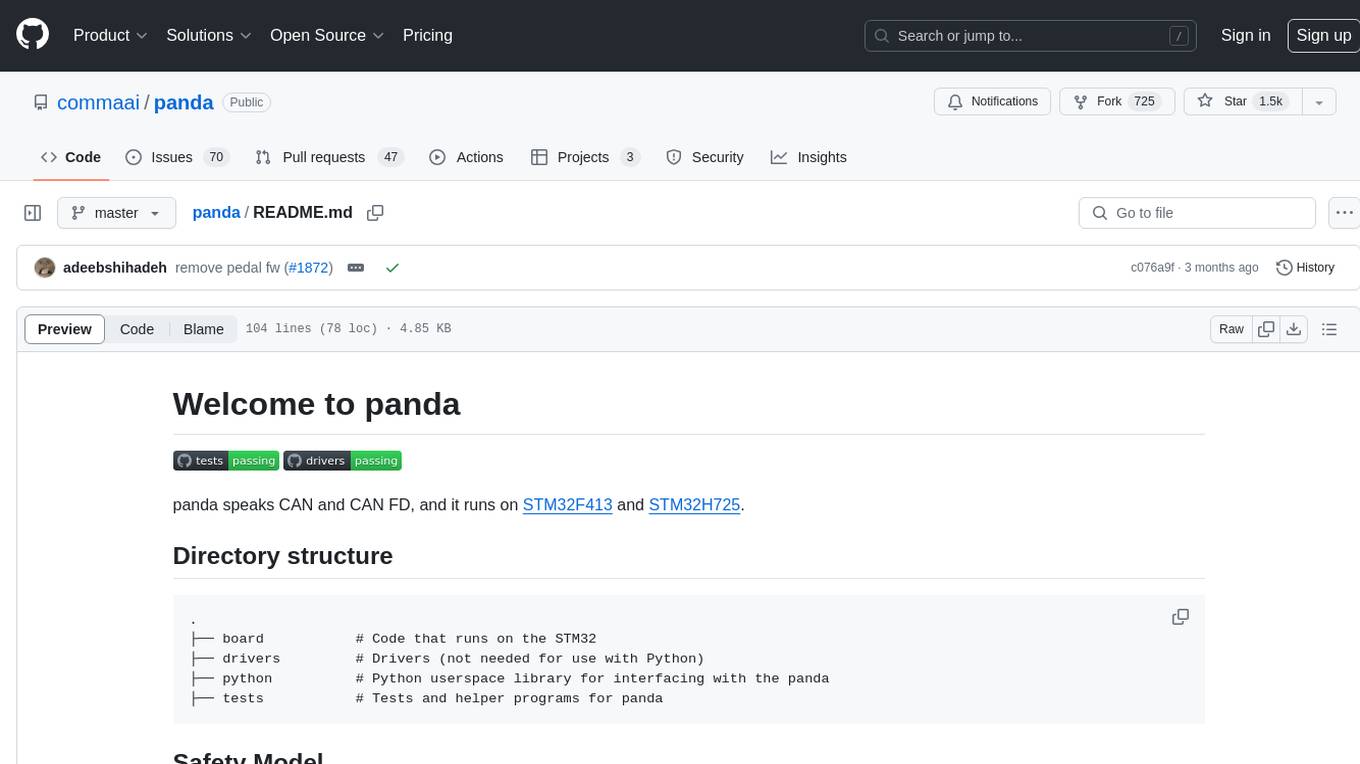
panda
Panda is a car interface tool that speaks CAN and CAN FD, running on STM32F413 and STM32H725. It provides safety modes and controls_allowed feature for message handling. The tool ensures code rigor through CI regression tests, including static code analysis, MISRA C:2012 violations check, unit tests, and hardware-in-the-loop tests. The software interface supports Python library, C++ library, and socketcan in kernel. Panda is licensed under the MIT license.